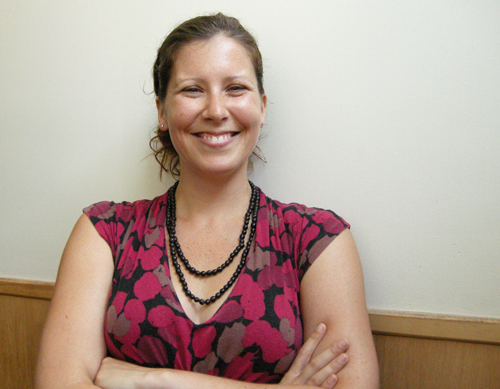
Some 9,000 people in the city of Buenos Aires, Argentina, make their living through informal waste recycling. “Informal” means they don’t have regular jobs in recycling plants; instead, they are picking through garbage bags that have been set out in front of homes or businesses and searching for cardboard, bottles, cans and other items that can be sold to recycling depots.
What’s it like to make a living sorting through other people’s garbage? That’s what U of G geography professor Kate Parizeau decided to research. “It’s not an easy life. These informal recyclers – called ‘cartoneros’ in Buenos Aires – are often seen as dirty or as potential thieves,” she says. “Some residents didn’t want them in their neighbourhoods at all, while others were more accepting. I wanted to understand how they worked, and what health risks they might be facing.”
Parizeau’s interest in environmental issues began during her childhood in Sarnia, Ont. “Sarnia is an environmental hot spot,” she says. “Because of the chemical processing plants there, we see higher rates of cancer and other diseases. It meant that environmental concerns were close to home for me.”
After completing her undergraduate degree in arts and science at McMaster University, Parizeau went to Central America to do volunteer work in a children’s home.
“That was my first opportunity to see the things I’d been reading about – like real poverty and social inequality,” she says. She returned to Canada to get a master’s degree in social and environmental planning and then a PhD in geography and environmental health at the University of Toronto. After graduation, she did a post-doc at the University of British Columbia, returning to Argentina to see if things had changed.
Parizeau discovered that the informal recyclers were not the poorest of the poor in Buenos Aires – in fact they were more like the lower-middle-class. “They were not homeless or indigent, and many were very savvy and knew a lot about the city. Most also worked at other jobs in factories or in construction, when those were available,” she adds.
Searching through garbage did lead to health problems, Parizeau found. But she realized that many of the other jobs open to these people – working in a tannery, for example – also posed health risks. “The poor are more likely to have dangerous work and to live in homes or communities without good sanitation,” Parizeau says. “Many of the issues faced by the informal recyclers were simply issues of urban poverty.”
In recent years, the municipal government of Buenos Aires – which had previously been quite hostile towards the cartoneros – decided to take a different approach. They began to organize the informal recyclers, assigning them specific territories and providing some base income, with the expectation that the recyclers would continue to sell the materials they found.
The cartoneros have mixed feelings about this, Parizeau reports. “Some people say they don’t want to be part of the system. There is a real distrust of government in Argentina. Others, however, are very excited about the opportunity to be recognized as a legitimate worker and to wear a uniform.”
At U of G, Parizeau hopes to continue her research in Latin America, perhaps investigating how informal recyclers work in other large cities or studying the effects of the government’s new regulations in Buenos Aires. She also wants to look at similar issues in Canada.
“I’m interested in issues of waste management, environmental health and social justice,” Parizeau explains. “For example, landfill sites tend to end up in poorer communities. When we lived in Sarnia, we had a landfill that was practically in our backyard. I remember the smells, and seeing the garbage floating in the air. I’m interested in how these sites are chosen, and what happens after they are closed. Do people know that the park their kids are playing in used to be a landfill? If so, does that even matter?”
Not surprisingly, Parizeau is also passionate about community involvement. “I need that community engagement to balance the time I spend just working on the computer,” she says. She’s looking for organizations in Guelph where she can make a contribution. Parizeau also likes to stay active by swimming, biking and doing yoga, and she keeps her hands busy with knitting. And she diligently sorts her garbage for recycling.